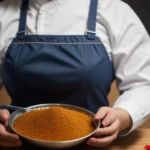Beyond the Bullfight: Discovering the True Essence of Spanish Gastronomy
Spain is a country famous for its vibrant culture, rich history, and stunning landscapes. While many people may associate Spain with bullfighting, there is so much more to this beautiful country than this controversial tradition. One of the most delightful aspects of Spanish culture is its gastronomy, which offers a true feast for the senses. From traditional tapas to innovative fusion cuisine, Spain’s culinary scene is a treasure trove waiting to be explored.
1. A Culinary Paradise: The Diversity of Spanish Gastronomy
Spain is a country of diverse regions, each with its own unique culinary traditions. From the rich seafood dishes of the coast to the hearty stews of the interior, Spanish gastronomy is a reflection of the country’s varied landscapes and climates. Each region offers a unique culinary experience, with dishes that are as diverse as the people who prepare them.
2. The Art of Tapas: Small Plates, Big Flavors
One of the most iconic culinary traditions in Spain is the practice of eating tapas. These small plates of food are perfect for sharing with friends and family, and can range from simple bar snacks like olives and almonds to more elaborate dishes like croquetas and tortilla española. Sampling a variety of tapas is a great way to experience the diversity of Spanish cuisine in a single meal.
3. Paella: A Taste of the Mediterranean
No discussion of Spanish gastronomy would be complete without mentioning paella. This iconic rice dish originated in the region of Valencia, and has become a symbol of Spanish cuisine around the world. Traditionally made with rice, chicken, rabbit, and a variety of seafood, paella is a delicious and satisfying meal that is perfect for sharing with loved ones.
4. The Wonders of Spanish Wine: A Perfect Pairing
No meal in Spain would be complete without a glass of wine to accompany it. Spain is home to some of the world’s finest vineyards, producing a wide variety of wines that pair perfectly with the country’s diverse cuisine. Whether you prefer a light and crisp white wine or a full-bodied red, Spain has something to please every palate.
5. Fusion Cuisine: Where Tradition Meets Innovation
In recent years, Spain has become known for its innovative fusion cuisine, which combines traditional Spanish ingredients and techniques with flavors and influences from around the world. Chefs like Ferran Adrià and José Andrés have gained international acclaim for their creative and daring approach to cooking, pushing the boundaries of what is possible in the kitchen.
6. The Rise of the Michelin Star: Fine Dining in Spain
Spain is home to a growing number of Michelin-starred restaurants, known for their impeccable service, exquisite presentation, and innovative cuisine. From the avant-garde creations of El Bulli to the classic dishes of Arzak, dining at a Michelin-starred restaurant is an experience not to be missed for any food lover.
7. Market Culture: A Foodie’s Paradise
One of the best ways to experience Spanish gastronomy is by visiting the country’s bustling markets. From the iconic Boqueria in Barcelona to the lively Mercado de San Miguel in Madrid, Spain’s markets are a feast for the senses, filled with the sights, sounds, and smells of fresh produce, seafood, and meats. Sampling local specialties and chatting with vendors is a great way to immerse yourself in the culinary culture of Spain.
8. Traditional Festivals: A Culinary Celebration
Throughout the year, Spain hosts a multitude of traditional festivals that celebrate the country’s culinary heritage. From the annual La Tomatina tomato fight in Buñol to the San Fermin running of the bulls in Pamplona, these festivals offer a unique opportunity to experience Spanish gastronomy in a fun and festive atmosphere.
9. The Importance of Tradition: Family Recipes and Time-Honored Techniques
Many of the dishes that define Spanish cuisine have been passed down through generations, with each family adding their own personal touch to traditional recipes. Whether it’s a grandmother’s recipe for gazpacho or a father’s secret marinade for grilled sardines, these family traditions are an essential part of the culinary culture of Spain.
10. Sustainable Dining: A Focus on Fresh, Local Ingredients
In recent years, there has been a growing trend in Spain towards sustainable dining, with many restaurants and chefs focusing on using fresh, local ingredients in their dishes. From farm-to-table restaurants to rooftop gardens, sustainable dining practices are helping to preserve the natural beauty and flavors of Spain for future generations to enjoy.
11. Food Tourism: A Culinary Adventure
For many food lovers, a trip to Spain is a culinary adventure that involves exploring the country’s diverse gastronomic landscape. From cooking classes and wine tastings to food tours and culinary workshops, there are countless opportunities to immerse yourself in the flavors and traditions of Spanish cuisine.
12. The Future of Spanish Gastronomy: Innovation and Preservation
As Spain continues to evolve as a culinary destination, chefs and food enthusiasts are working to balance innovation with tradition in order to preserve the country’s gastronomic heritage. By embracing new techniques and ingredients while honoring the rich culinary traditions of the past, Spain is poised to remain a vibrant and exciting destination for food lovers around the world.
13. Culinary Diplomacy: Sharing Spanish Gastronomy with the World
Spanish gastronomy has a long history of influencing and being influenced by other cultures, and today, it plays an important role in the country’s diplomatic efforts. From hosting food festivals and culinary competitions to promoting Spanish wine and cuisine abroad, Spain uses its gastronomic heritage to showcase the best of its culture and traditions to the world.
14. A Culinary Renaissance: Rediscovering the Joys of Spanish Cooking
As more people around the world discover the pleasures of Spanish gastronomy, there has been a renewed interest in traditional cooking techniques and recipes. From homemade paella parties to backyard barbecues featuring grilled sardines and chorizo, cooking and eating Spanish food has become a social and cultural experience that brings friends and family together.
15. Conclusion: A Feast for the Senses
In conclusion, Spanish gastronomy is a true feast for the senses, offering a rich tapestry of flavors, textures, and aromas that are sure to delight any food lover. From the traditional tapas of Andalusia to the avant-garde creations of Catalonia, Spain’s culinary scene is a reflection of the country’s diverse history, culture, and landscapes. Whether you’re savoring a glass of Rioja in La Rioja or enjoying a plate of jamón ibérico in Madrid, dining in Spain is an experience that will leave you craving more. So, next time you find yourself in Spain, be sure to look beyond the bullfight and discover the true essence of Spanish gastronomy. Your taste buds will thank you.
















